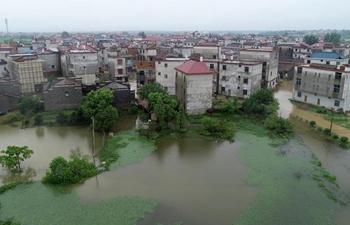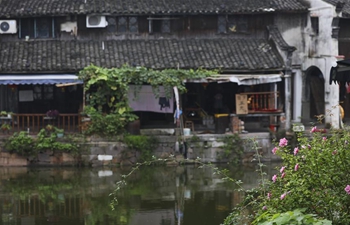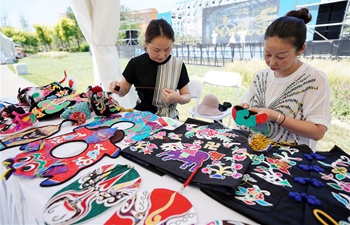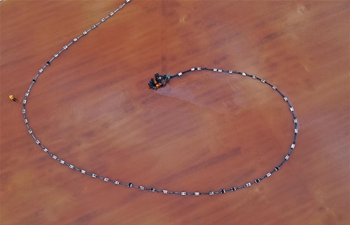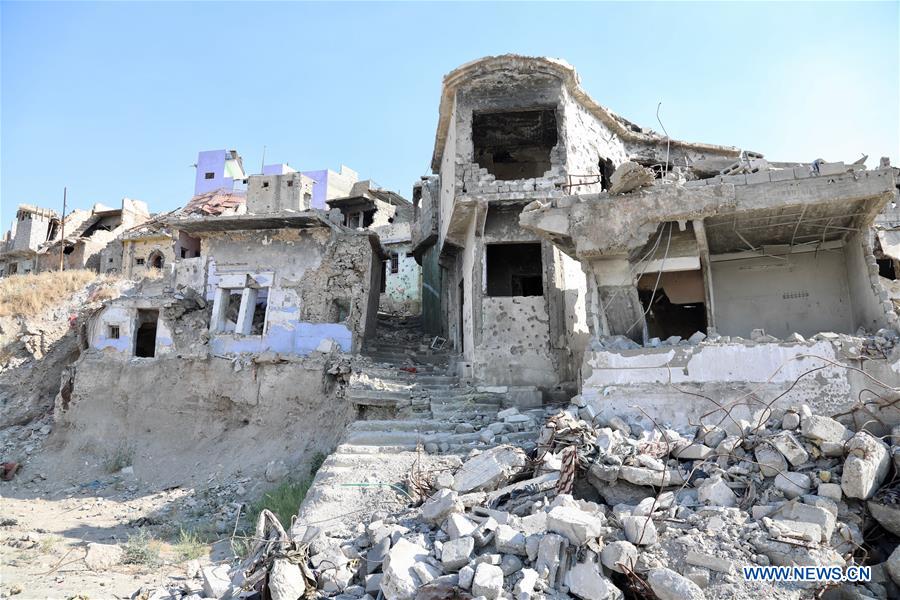
Photo taken on July 2, 2019 shows remains in the devastated Mosul's old city center in Mosul, Iraq. TO GO WITH: 2 years after liberation, reconstruction remains far-fetched dream in Iraq's Mosul (Xinhua/Khalil Dawood)
by Nabil Salih
MOSUL, Iraq, July 9 (Xinhua) -- The guns fell silent and the euphoria of victory faded away but reconstruction remains a far-fetched dream for residents of the battered old town in the western side of Iraq's northern city of Mosul even two years after its liberation from the Islamic State (IS) militant group.
Between 2016 and 2017, nine gory months of fighting for liberation turned thousands of homes into rubble, with few homes having been rebuilt.
Warning signs were scribbled in red paint on the walls of destroyed buildings to alert passers-by to potential explosives among the rubble.
VANISHING HOPES
Last year, Ali Saadi hoped to be the first to rebuild home to help his family shake off the shadows of war but poverty and unemployment hindered the reconstruction process in addition to the absence of government assistance.
"I couldn't make my dream come true because a donor only paid to erect one storey of the house, and I am unemployed and the government hasn't paid any compensation," Saadi, 45, told Xinhua.
Saadi's house was destroyed in an indiscriminate airstrike by the U.S.-led coalition in 2017. He and his firstborn daughter were injured when they escaped the fierce battle in his alley.
The injury paralyzed his 17-year-old daughter Abeer, who now has to crawl on her knees or move on a wheelchair around a house they're renting for about 130 U.S. dollars.
Saadi worked as a butcher before the war, but his shop was looted during the liberation operation, and what he earned in the past year was barely sufficient to pay the rent.
"The most important thing for me is to return to my home. I can't afford the rent anymore and we've been exhausted," he lamented.
LUCKIEST MAN IN THE WORLD
Despite the injuries that Laith Najim and his son sustained when a mortar shell fell at their front door, Najim still thinks he is the "happiest man in the world" because his home was the only one left almost intact in the aftermath of the disastrous battle.
"I am very lucky because my house was almost intact, apart from a little damage that was repaired by an aid group and now we're living here," Najim, a fisherman, told Xinhua.
Najim recounted how many of his neighbors had sought for shelter in his basement after their homes were bombed during the fighting.
"They want to go back but they have to remove the debris first and they can't afford to do so," he said.
The Najim family used to spent leisure time on the rooftop of their house where they enjoyed a spectacular view of the city that straddles the Tigris River.
"It used to be the finest view in the world. We used to have diner here and everyone slept on the rooftops of their houses during hot summer nights," he reminisced as he sat on a wooden bench on his rooftop.
Nowadays, the evenings of the Najim family are often spoiled by putrid odors of rotten bodies buried deep under the rubble and carried along by the wind.
LINGERING WOES
On June 21, 2017, IS militants blew up the 846-year-old Grand al-Nuri Mosque and its leaning minaret.
Two years after liberation from the IS, the destroyed minaret still lies in the yard of the mosque and the vicinity looks as grim as a graveyard.
A few shops reopened near the mosque and life slowly recovered with assistance of aid organizations that rehabilitated sewage systems, rebuilt homes and helped locals restart their businesses.
At a nearby teahouse, young men in shorts and colorful T-shirts played cards and smoked. They enjoyed a sense of freedom but complained of unemployment.
Mahmoud Dawoud, a 57-year-old shop owner, said the area witnessed little progress over the past two years and only a few families have returned.
"People will return when reconstruction starts but so far aid organizations and donors did all the efforts but the government hasn't done anything," he told Xinhua.
Dawoud blamed officials in Baghdad and the local government for turning a blind eye to the sufferings of the people.
In April 2018, the United Arab Emirates (UAE), Iraq and the UNESCO signed an agreement over the reconstruction of al-Nuri Mosque and its minaret whereby the UAE promised to provide over 50 million U.S. dollars for the project.
Over one year later, the project hasn't seen the light yet and the most prominent landmark of the city still lies in ruin.
UNMET NEEDS
On July 4, 2017, a huge ball of fire slammed into Firas Khalid's house in the old town, killing his mother and severely wound one of his daughters, months after an IS doctor killed his wife by a wrong injection.
When he returned to dig out his mother's body from underneath the rubble, all he took to the cemetery was her skull and upper body, as the rest disappeared in the bombing.
With no job opportunity to support his family, 42-year-old Khalid has been surviving on donations from locals for two years.
A charity foundation was distributing food, donated by the government of Kuwait, for 2,000 families of widows and orphans in Mosul.
Each of the 30 kg food basket consisted of 11 essential items such as beans, rice, tomato paste and cooking oil.
Hundreds of widows, dressed in black abayas and accompanied by their children, have been queuing up since the early hours of the morning.
Among them was Layla Said, a 43-year-old widow and mother of four girls.
"My husband was killed in a coalition airstrike in 2017," Said told Xinhua, adding she has no source of livelihood and depends on assistance from aid groups to survive.







